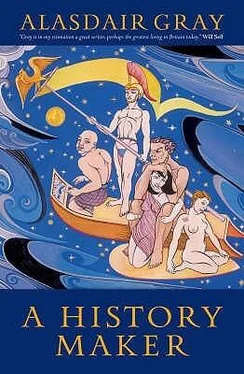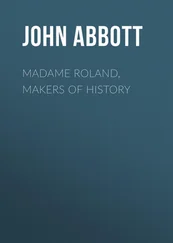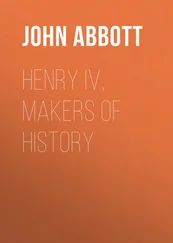Gibbon completed his Decline and Fall of the Roman Empire in 1788. The French Revolution started a year later and convinced him that civilization would always be a few brief decades between eras of barbarism. In this he differs from Thomas Carlyle who believed human history would have been meaningless if the French Revolution had NOT broken out.
Note: The notion that a civilization, empire or nation is a prosperous minority for whom the rest exist was a historical commonplace, though the size of the minority varied. Here are a few of their names: Aristocracy, Equestrians, Lords, Gentry, Officers, Brahmins, Mandarins, Court-and-Camp, Church-and-State, The City, The Bourgeoisie, Le Monde, Society, The Party, The Nomenclatura, The Executive Class and (in twentieth-century England where social manipulators were too modest to declare themselves) The Middle Class.
Page 116.
Our rational Utopia is about to go boom and fall apart too and you, Wat Dryhope, are the virus of the plague which is going to destabilize it.
destabilize = to secretly undermine or subvert a government or economy so as to cause unrest or collapse, thus making a land available to outsiders who have not declared war on it. In the eighteenth and nineteenth centuries civilized traders did this by giving native tribesmen, in return for local produce, blankets in which people had died of smallpox; but the most effective way of weakening people was by destroying their food supply. After the United States government had signed a peace treaty with the central American redskin nations it built forts across the prairies to ensure the treaty was kept. The soldiers in the forts, assisted by white settlers and sportsmen, then exterminated the buffaloes on which the Indians depended for food. Indians who fought to prevent this were killed with rifles and machine guns because they were breaking the treaty. The starving remainder (chiefly women and children) had to beg for food at the forts and were given some on condition that they shifted to less fertile lands, lands which the white man did not want until oil was discovered on them a few decades later.
In the twentieth century rich trading companies toppled electoral governments in South America and Asia by a combination of bribery, financial manipulation and lying news stories. They were assisted by governments they had bribed. Since these governments were nominally democratic the assistance was given chiefly through secret intelligence networks.
The virus used by Delilah Puddock to destabilize the modern world was developed on the K20 asteroid, and aimed to combine the advantage of all previous methods. It was a normally harmless strain of the common cold which she passed to Wat through sexual congress after weakening his immune system with drugs. It was so infectious and contagious that a few hours later he passed it to almost everyone he spoke to or who shook his hand. The virus had hardly any noticeable effect on people’s health, but harboured a nanomechanism which became active and started replicating when it touched a powerplant, eventually destroying the plant’s ability to photosynthesize. The inventors of this plague hoped to achieve the following results.
1 — The death of half the world’s powerplants in a week. Households using them would have no food but what they grew or could hunt on the commons. Besides hunger they would also lack heat, lighting, sewage disposal and means of recycling waste.
2 — In seeking help from uninfected neighbours they would spread the disease further. When households in uninfected districts realized this they would keep out infection by creating boundaries and forbidding the starving to cross. This would enclose the commons, make all travellers dreaded and rejected, divide humanity once more into the desperate poor and selfish prosperous.
3 — The frontiers would be defended by soldiers who would want guns, grenades and bombs to avoid being infected through hand-to-hand fighting. These would be ordered from domestic powerplants, thus depriving homes in the uninfected areas of items everyone took for granted and putting women under military rule. Generals would also form world-wide alliances to keep the poor householders in their places. A stern military patriarchy would therefore replace mild matriarchy as a system of government.
4 — The Red Cross would try to organize famine relief co-operatively through the open intelligence net but be defeated by the size of the problem. The network would soon evolve seedlings of a plague-immune powerplant, but since these would be distributed under military control the dominant officer class in healthy areas would first replace their own powerplants with the plague-immune kind, postponing help for the poor indefinitely for reasons of security.
5 — Powerplants take at least thirty years to reach household-supporting size and before then the new ruling class would see any wide extension of peaceful prosperity as a miserable levelling down, a failure of law and order. Like all patriarchies they would have acquired wives and mistresses who supported them and wanted to give their advantages to their children. They would do so by continuing the scarcity which allowed them to dominate the rest. The patriarchs would therefore grow powerplants on estates carved out of the commons, employing some of the poor to keep the rest out and paying them with food and occasional luxury items. In these conditions it would soon become possible to run the world on a monetary basis again.
6 — Chaotic historical eras tend to be dominated by monstrous egoists. Alexander the Great, Augustus Caesar, William the Conqueror, Tamerlane, Henry the Eighth, Ivan the Terrible, Frederick the Great, Napoleon, Bismarck, Stalin, Mussolini, Hitler, Thatcher would have been harmless if treated as equals by sensible people. But in competitive historical states common sense is scorned. Both rich and poor want leaders who embody Godhood, Destiny, Unyielding Reality, so many give unlimited obedience to whoever best acts such parts. Delilah Puddock’s clique of plotters gloried in their insane egoism. They were sure their longevity and foreknowledge of events would make them rulers of a new historical era.
Page 119.
The bright old day now dawns again etc. This is the last verse of a ballad which Charles Dickens contributed to The Examiner in August 1841. It parodies a right-wing popular song. Here is the full text.
THE FINE OLD ENGLISH GENTLEMAN
(New Version, to be said or sung at all
Conservative Dinners)
I’ll sing you a new ballad,
and I’ll warrant it first rate,
Of the days of that old gentleman
who had that old estate;
When they spent the public money
at a bountiful old rate
On ev’ry mistress, pimp and scamp,
at ev’ry noble gate,
In the fine old English Tory times;
Soon may they come again!
The good old laws were garnished well
with gibbets, whips, and chains,
With fine old English penalties,
and fine old English pains,
With rebel heads, and seas of blood
once hot in rebel veins;
For all these things were requisite
to guard the rich old gains
Of the fine old English Tory times;
Soon may they come again!
This brave old code, like Argus,
had a hundred watchful eyes,
And ev’ry English peasant
had his good old English spies,
To tempt his starving discontent
with fine old English lies,
Then call the good old Yoemanry
to stop his peevish cries,
Читать дальше












